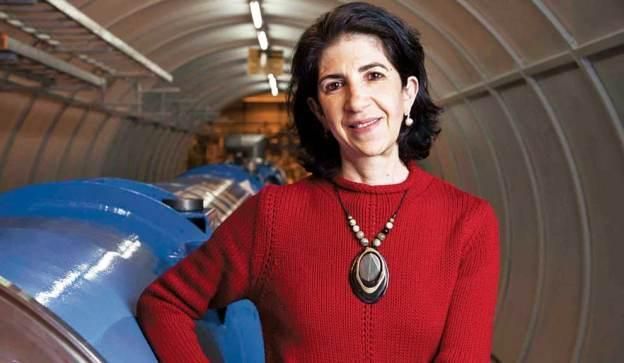Dr Giannoti is the incoming director of CERN. She is the previous spokesperson of ATLAS project at CERN that was involved in the 2012 discovery of the Higgs Boson. She will take over the post of director from January 1 2016 and she will be the first woman in this role.
Speech
In her speech to the Phil, Dr Giannoti explained that CERN is the fundamental lab for most elementary constituents of matter. The new challenges include the need to develop new technologies, including cryogenic technology to cool the particle accelerators down to extremely low temperatures of about 4 K. She also spoke about CERN being a place that brings people from around the world together to work towards a common goal using the most powerful particle accelerator in the world. While the LHC was used to make scientific discoveries, like the Higgs boson, the technology developed to achieve that, is now applied to other areas such as medicine or industry. Hence, particle accelerators can be used commercially for the benefit of the society.
Questions and Answers
During the question and answer session students asked many important questions.
One question was about why Giannoti came to CERN in the first place and what her new vision for CERN is? She replied that physics contributes to fundamental questions. To her particle physics was the natural answer to the fundamental nature of the world. In the future she plans on expanding CERN’s mission in fundamental research, technological innovation and education. She stressed that diversity is a very important aspect of the population of CERN staff and affiliations.
Giannoti was then asked if she was ever discriminated against in science because of being a woman and she replied that personally she did not feel discrimination of any kind in science. Although some colleagues of hers do not share the same experience. She said that 20% of the CERN population is female. Similar or lower figures are seen in other physics facilities and in physics and mathematics departments. Studies show that women are victims of unconscious bias and research should not present female candidates with obstacles of this kind. But all candidates should also be able to fight for research positions by never giving up.
When asked if she has any concerns about being the director, Giannoti replied that although worried she likes challenges and will do her best. She said that a great thing about CERN is that it is a network of collaborating researchers. With an average age of staff of just 26, she hopes her young colleagues will help.
New high energies and the Standard Model of Particle physics also featured in the question session. All particles and their interactions predicted in the model have been discovered. However, SM is not complete. The universe is a dark place: we see only 5% of the matter in the universe. The rest of the universe, that is dark matter and dark energy, are basically unknown. We can deduce their existence from observations, e.g. from motion of galaxies. We see that there must be more matter around galaxies to explain their dynamics. A theory beyond the standard model is still to be discovered. Perhaps with new energy scales, new aspects of the beyond the standard model theory can be revealed
Giannoti was asked to comment on China’s plans to build a supercollider. CERN and China are both designing a supercollider with a larger ‘ring’. Although such machines won’t start working before 2035, early planning is necessary. Indeed planning for the LHC began in the 1980s. Other options, such as a linear collider are still open, and the final decision will rest on what we find now.
One very important question was how do you justify being a member state of CERN. Giannoti replied that member states participate in the advance of knowledge of matter and universe. On a more practical level, the high technology instruments developed in member states are great for the researchers working on such projects. And the fundamental research undertaken in member states is the most stimulating for creativity. It is not constrained by research with say, direct commercial purpose. Creativity and new ideas are the fuel of whole progress. As history has shown, science goes forward by breakthroughs that come from fundamental research.
About what advice she’d give to students, she said that if you love science, just do it! There is nothing better than contributing to the advancement of human knowledge. Indeed, 50% of undergraduates go on to graduate studies. The rest are highly sought after by the private sector.
The final question asked Giannoti if she could change her career, what would she do. She replied that she would do many things, perhaps play the piano or work in neuroscience.
Ireland and CERN
It is a shame that Ireland is not a member state of CERN. Because of this Irish scientific research in particle physics is non-existent and we are missing out on many projects and other opportunities. Students and researchers must migrate to member state countries to become particle physicists and do research. A strong public information campaign should be carried out to convince the nation and the politicians of the benefits of joining CERN. If this doesn’t happen soon, Irish science will continue to suffer.







